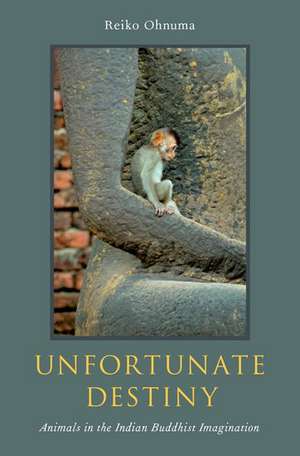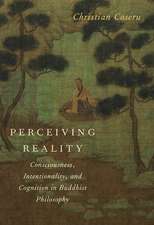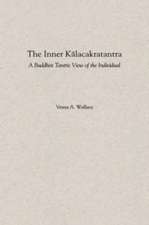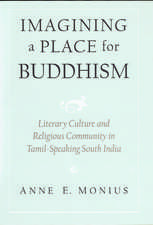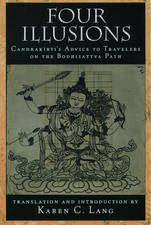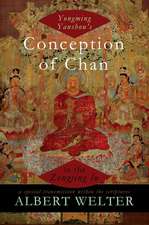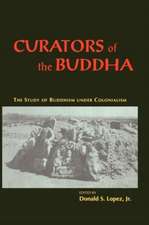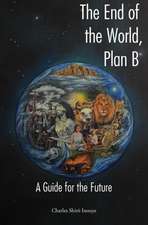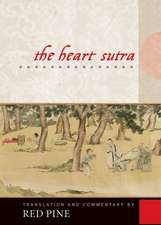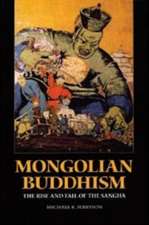Unfortunate Destiny: Animals in the Indian Buddhist Imagination
Autor Reiko Ohnumaen Limba Engleză Hardback – 15 iun 2017
Preț: 293.81 lei
Preț vechi: 332.39 lei
-12% Nou
Puncte Express: 441
Preț estimativ în valută:
56.24€ • 61.11$ • 47.27£
56.24€ • 61.11$ • 47.27£
Carte tipărită la comandă
Livrare economică 10-16 aprilie
Preluare comenzi: 021 569.72.76
Specificații
ISBN-13: 9780190637545
ISBN-10: 0190637544
Pagini: 266
Dimensiuni: 160 x 239 x 28 mm
Greutate: 0.48 kg
Editura: Oxford University Press
Colecția OUP USA
Locul publicării:New York, United States
ISBN-10: 0190637544
Pagini: 266
Dimensiuni: 160 x 239 x 28 mm
Greutate: 0.48 kg
Editura: Oxford University Press
Colecția OUP USA
Locul publicării:New York, United States
Recenzii
With its broadly framed arguments and well-considered approach to the Buddhist representation of animals, this book would make a superb addition to undergraduate courses in the religious traditions of South Asia or in world religions -- particularly those that seek to inspire significant discussion.
Ohnuma is a clear and evocative writer, who always keeps her audience in mind and brings the multi layered symbolism of animals in early Buddhist literature alive. This book would be suitable to use in an undergraduate class on Buddhism and is also an important contribution for scholars of Buddhism, religious studies, or Indian literature.
[A] highly valuable and often revealing interpretation of the depiction of animals in early Buddhism, one that is of interest not only to Buddhist Studies, but certainly offers important insights for the broader audience of current Animals Studies.
In Unfortunate Destiny: Animals in the Indian Buddhist Imagination, Reiko Ohnuma has succeeded in writing a readable, lively, entertaining, and outstandingly scholarly study. I was grateful for both her wit and lively turn of phrase and the depth of the analysis at hand. It is a work that will be central to any discussion of animals and animality in Buddhist studies for years to come. It will also clearly be of interest in religious studies and related disciplines whenever there is a discussion of religion and our nonhuman friends.
Reiko Ohnuma's marvelous new book... shows us the complexity of early Buddhists' feelings about animals, feelings that are shaped by both spiritual aspiration and moral ambivalence.
Ohnuma is a clear and evocative writer, who always keeps her audience in mind and brings the multi layered symbolism of animals in early Buddhist literature alive. This book would be suitable to use in an undergraduate class on Buddhism and is also an important contribution for scholars of Buddhism, religious studies, or Indian literature.
[A] highly valuable and often revealing interpretation of the depiction of animals in early Buddhism, one that is of interest not only to Buddhist Studies, but certainly offers important insights for the broader audience of current Animals Studies.
In Unfortunate Destiny: Animals in the Indian Buddhist Imagination, Reiko Ohnuma has succeeded in writing a readable, lively, entertaining, and outstandingly scholarly study. I was grateful for both her wit and lively turn of phrase and the depth of the analysis at hand. It is a work that will be central to any discussion of animals and animality in Buddhist studies for years to come. It will also clearly be of interest in religious studies and related disciplines whenever there is a discussion of religion and our nonhuman friends.
Reiko Ohnuma's marvelous new book... shows us the complexity of early Buddhists' feelings about animals, feelings that are shaped by both spiritual aspiration and moral ambivalence.
Notă biografică
Reiko Ohnuma is Professor of Religion, Asian and Middle Eastern Studies, and Women's, Gender, and Sexuality Studies at Dartmouth College in Hanover, New Hampshire. She is a specialist in the Buddhist traditions of South Asia, with a particular focus on narrative literature, hagiography, and the role and imagery of women.
